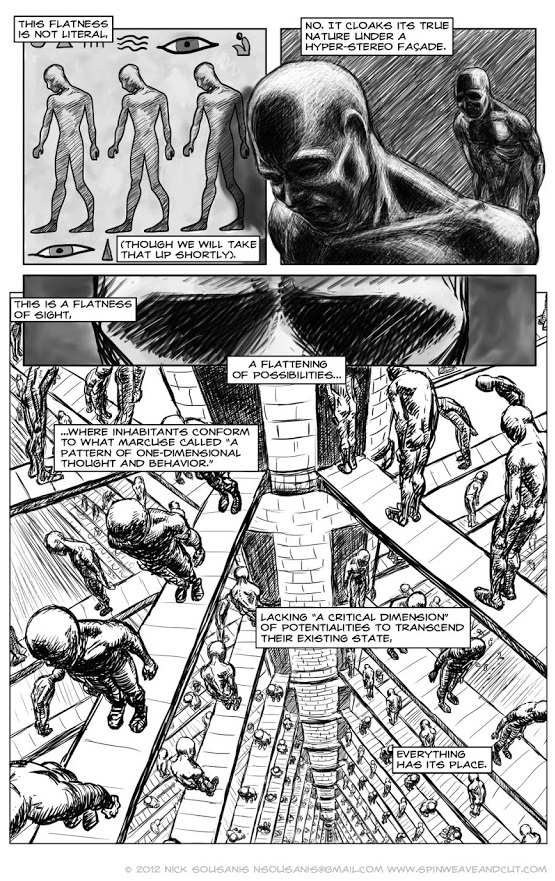by Guest Blogger Joseph Manuel Nieves
The first thing that struck me as I began to read Nick Sousanis’ Unflattening – the first doctoral dissertation in comics form accepted by Teacher’s College at Columbia University, and the first comic published by Harvard University Press – is that I’ve rarely read a comic that wasn’t a narrative. The only other examples I can think of are Scott McCloud’s Understanding Comics and its follow ups. Like those, Unflattening isn’t a story. It’s a monograph, the most beautiful academic essay I’ve ever seen, complete with cited sources and notes.
Sousanis’ main argument is that images, in conjunction with text, can help us understand the world around us in ways that are impossible for text to do on its own. Indeed, the format he’s chosen itself works to support the thesis. For Sousanis, it’s all about new perspectives. He uses a visual analogy of eyes working together to produce a stereoscopic view of our environment to demonstrate. Because of the space between them, each eye sees the world from a unique perspective, but only when used together are we able to perceive depth. It takes two different views operating in tandem to come to a new understanding about what’s being observed. And that’s just the beginning of the rabbit hole.
The second thing that strikes me is that, despite this not being a narrative, I can’t help but apply narratives to Sousanis’ stunning images. The book opens with illustrations of human figures moving along a complex system conveyor belts. It’s the assembly line from hell (maybe the DMV?), with signs hung reading “Stay in Line” and “Maintain Proper Distance”. Each figure stands uniformly submissive, with their heads and shoulders slumped. They look sad, and I immediately begin to wonder about them. Who are they? How did they get here? It’s a dramatic image. And the more I think about, the more in awe I am of what Sousanis has accomplished here. I’ve never read a scholarly work that elicited this kind of emotional response from me. To be clear, this is a truly intellectual volume, one which earned its author a PhD in education, but it’s also a very stirring work of art. How many PhDs can say that about their dissertations?
This emotional component adds another dimension to the reading, while simultaneously contributing to his argument. According to Sousanis, part of the reason the world became “flat” is that we’ve lost some of our sense of wonder. Our accumulation of knowledge has accelerated exponentially, leading to increasingly narrow fields of study as we strive to draw in all the edges of the map. We’ve answered most of the big questions, the ones that first stirred us to wonder. Now as we look further out, or more deeply in, we compartmentalize, closing ourselves off from other perspectives. Sousanis is suggesting that a more interdisciplinary discourse is needed in order to come to new understandings about, well, everything. It’s a call to action, that action being to wonder. Ah, but there’s, as Shakespeare wrote, the rub – wonder is both an action and a feeling, speculation and awe. Which is he asking of us? The text points us in one direction, the images move us in another, and the answer appears to be in a magical third space in between.
This is a fascinating achievement. I’m a firm believer in comics’ ability to illuminate the dark corners of the world, to inspire growth and change, the way that all great literature does. But I never imagine comic books functioning as anything other than a storytelling medium. I never consider their capacity to communicate in other ways. What are the limits of its applications? How much longer before we begin seeing the first textbooks in comic book form? Comic book souffle recipes? Legal contracts? Tax forms? I suppose the answer to that lies in our willingness to de-compartmentalize, and step away from our narrow – sometimes strongly-held – views, in order to gain a new perspective.
Unflattening is available online at the Harvard University Press website and Amazon. You can also check out samples of the art on Nick Sousanis’ blog.
Guest Blogger: Joseph Manuel Nieves: somejosephperson@gmail.com
https://comicspectrum.com/ Covering the full spectrum of comics culture



Pingback: Spin Weave and Cut | Deleted Scenes & Reviews
Pingback: Publications Available on *Unflattening* Portal | Unflattening